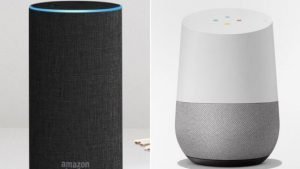
Music broadcasters seeking to increase their reach with digital listeners via online platforms ‘Smart Speakers’ & ‘Personal Assistants’ may want to pay attention to some crucial advice from broadcasting lawyer David Oxenford. His timely response is due to the number of radio stations & broadcast groups enthusiastically examining expanded reach via Alexa, Google Home, Amazon Echo & others. He’s written an in-depth article about this in his “Broadcast Law Blog”.
Locally, as a regular listener to 88.5 KNKX, I hear a promo instructing listeners on how to listen to the station via these new products. Oxenford points out that these devices are not radio receivers & do not contain FM radio ‘chips’ to allow reception. These are all IP-based devices, and as such, when instructions are given: “Alexa, tune in to KNKX” – for example – the devices connect to the radio stations’ streams & not their off-air signals. That changes the royalty picture for broadcasters & inevitably much higher costs for music based radio stations.

Increased fees to SoundExchange for listener stream connections are an important cost factor to consider. When you ask Alexa or Google Home to play your favorite station, you are calling up a digital stream, and each digital stream gives rise to the same royalties to SoundExchange that a station pays for its webcast stream on its app or through a platform like TuneIn or the iHeartRadio. For 2018, the SoundExchange rate is $.0018 per song per listener. These royalties are in addition to the royalties radio broadcasters pay to ASCAP, BMI, SESAC and in some cases GMR. It should be noted that over-the-air broadcasts are not subject to SoundExchange royalty payments, only the stream(s).

As the popularity of this new technology to connect listeners to radio programming increases, broadcasters may have again reconsider the idea of some sometimes sticky negotiations with all of the parties involved regarding royalties paid. Perhaps there will have to be some future trade-off between stations’ payments based on over-the-air transmission vs digital streams. Broadcast lawyers such as David Oxenford make it clear that there will be the necessity of future negotiations if music based radio wishes to remain profitable into the future, and not subject to excessive royalty costs due to streaming via Smart devices. Food for thought the next time we ask our Smart Speakers & Personal Assistants to connect us to our favorite music stations.
retired broadcaster: on-air, MD, PD, asst PD, Prod Mgr, IT, station technician/engineer, pioneer Internet webcaster, station installation/maintenance; 12 years in commercial radio, 17 years volunteer in campus/community radio in B.C., Alberta & Wash. Amateur radio operator & “DXer” specializing in AM night-time DX, short-wave DX/listening & remote SDR DXing/listening




